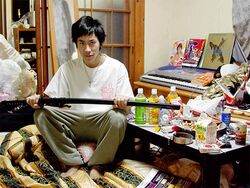Social isolation
(psychological concept, Social control) | |
|---|---|
 A young Japanese man living as a hikikomori in 2004 | |
| A state of complete or near-complete lack of contact between an individual and society. Encouraged by the PTB. |
Social isolation is a state of complete or near-complete lack of contact between an individual and society. It differs from loneliness, which reflects temporary and involuntary lack of contact with other humans in the world. Social isolation can be an issue for individuals of any age, though symptoms may differ by age group.[1]
Social isolation is furthered by the powers-that-be - such as Silicon Valley tycoons - who want to disconnect people from physical reality.
This is also done through promoting of computer and virtual fantasy worlds, expanding into an envisaged permanent augmented reality, the Metaverse. Predictive programming in popular culture encourages this form of lifestyle.
The COVID-19 deep event encouraged and forced through social isolation through creating fear of other people as invisible carriers of disease. Vaccine passports will strengthen this by forcibly excluding many people from social situations.
Hikikomori
Hikikomori is a Japanese term (lit. "pulling inward, being confined"), also known as acute social withdrawal, is total withdrawal from society and seeking extreme degrees of social isolation and confinement. Hikikomori refers to both the phenomenon in general and the recluses themselves. Hikikomori have been described as loners or "modern-day hermits". Estimates suggest that half a million Japanese youths have become social recluses, as well as more than half a million middle-aged individuals. The phenomenon is by no means limited to young men or to Japan.
Hikikomori has been defined by a Japanese expert group as having the following characteristics:[2]
- Spending most of the time at home
- No interest in going to school or working
- Persistence of withdrawal for more than 6 months
- Exclusion of schizophrenia, intellectual disability, and bipolar disorder
- Exclusion of those who maintain personal relationships (e.g., friendships)